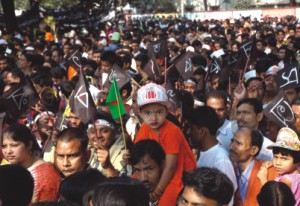|
Peceptions
Preserving the Autonomy of the Bangla Language
Arefeen Ahmed
 |
Bangla seems to be cherished only an specific creasions such as 21st February and Pahela Baishakh |
During the jubilant month of Ekushey, in which our celebrated mother tongue ought to be the hallmark of every Bangali's linguistic wealth, it still seems that Bangla is cherished or remembered for its extravagance only on specific occasions such as 21st February and Pahela Baishakh. After that, our matri bhasha will somehow be brushed under the carpet and will take a back seat, letting English slit its throat for the remainder of the year.
This sentiment is actively demonstrated by the often overpowering wave of foreign pop and film culture mainly propelled from Hollywood or Bollywood to the world, exposing all of us to its pizzazz the whole year round.
Bangladesh is no exception. Its subjects “the youth of contemporary urban society” who are the latest casualties dread to think in Bangla, let alone speak it or even pick up Bangla literature. When these youngsters are told to use Bangla the expression, “Oh Bangla!” puts its foot in. Their impression is that Bangla is a tough language and extremely traditional; it cannot possibly tailor to the expressions and ideate in quite the same manner as that of a language such as English. The worst hit in this linguistic overshadowing of the Bangla language are those individuals who virtually have no connection with this nation, e.g., second generation Bangladeshi expatriates including those who have returned to Bangladesh, but find it extremely difficult to communicate in their native tongue. Like the urban youth, these people feel that they are losing out in every sense of the term when resorting to Bangla phrases, sentences, etc and so are comfortable with practising the act of code mixing or code switching by either blending or changing from English to Bangla.
 The consequence of giving Bangla less significance in its own territory outlines an identifiable linguistic pattern that seems to be plaguing our youth. Bell, a pioneer in the field of Socioliguistics (studying the relationship between language and society and vice versa) introduced seven principles that he directs to the existence and perception of a true language or dialect. Mixture, Reduction and Autonomy are three out of Bell's seven principles that are relevant to upholding the stature and prowess of the Bangla language. Mixture refers to the feelings speakers have toward the purity of the variety of language that they speak. This varies from one speaker to another. Mixture, talks about the potential borrowing of words, grammatical rules, etc between languages that English and other Germanic languages have undergone. If borrowing has occurred on a large scale then speakers will perceive their linguistic heritage to be reduced, thus their language will appear to be mixed with that of another and vice versa. The principle of Reduction describes whether a language has been reduced or shortened in any way in terms of lexis, grammar, etc. if so, then a relatively low level of linguistic wealth is derived and vice versa. The consequence of giving Bangla less significance in its own territory outlines an identifiable linguistic pattern that seems to be plaguing our youth. Bell, a pioneer in the field of Socioliguistics (studying the relationship between language and society and vice versa) introduced seven principles that he directs to the existence and perception of a true language or dialect. Mixture, Reduction and Autonomy are three out of Bell's seven principles that are relevant to upholding the stature and prowess of the Bangla language. Mixture refers to the feelings speakers have toward the purity of the variety of language that they speak. This varies from one speaker to another. Mixture, talks about the potential borrowing of words, grammatical rules, etc between languages that English and other Germanic languages have undergone. If borrowing has occurred on a large scale then speakers will perceive their linguistic heritage to be reduced, thus their language will appear to be mixed with that of another and vice versa. The principle of Reduction describes whether a language has been reduced or shortened in any way in terms of lexis, grammar, etc. if so, then a relatively low level of linguistic wealth is derived and vice versa.
It is to perverse forms of Mixture and Reduction that we are giving in to linguistic capitalism, the strategic dominance of, in this case, English, in all spheres of communication including the media. Nevertheless, putting the blame on the English language will not justify our own actions, though English is the language of globalisation, this does not justify our right to supercede it for Bangla in any way whatsoever. If all Bangalis were to get caught up in the frenzied attack on Bangla, then there would be no need of celebrating an “International Mother Language Day”, the painstaking efforts of the language movement of 1952 and our beloved freedom fighters might as well be in vain. As a result, we the citizens of Bangladesh would be the real culprits, guilty of slaying the Bangla language.
It is up to us, especially the youth residing in our society, to withstand the suffocating effects of the global media and seek Autonomy. Autonomy is the third of Bell's proposed principles that states that a language or dialect is truly autonomous if it does not require borrowing, mixing, or shortening of its lexis, grammar, etc. A speaker must be able to express himself with a rich supply of these linguistic resources for him/her to perceive that their language is indeed autonomous. Culture-specific terminology plays an important role in the process of establishing Autonomy. Imagine how you would feel if you were not able to express words such as rickshaw, ghumta or rosher golla, unless it was in a language other than Bangla. Is it not at these moments that the existence of the Bangla language stands before us as a gift that we should treasure at all times? Autonomy is an ideal state that should preside in all language systems across the globe.
One approach to getting the youth interested in Bangla could be by implementing workshops or seminars that teach how to use Bangla through such fun-filled activities as getting individuals to construct their own poems, short stories, etc. This would undoubtedly challenge and encourage talented young writers to contribute prolifically to the Bangla literary society. Telecasting more talk shows where students take the floor or conducting polling of potential issues that young adults would like to read about in Bangla magazines or books, is another ideal attempt to get people involved.
In the end, the verdict is that it becomes very easy to get sidetracked, so let us now start to salvage the opulence of the Bangla language, not because our elders desire it, but because it is the intellectual thing to do before we lose sight of its prestige entirely.
Copyright (R) thedailystar.net 2007 |
